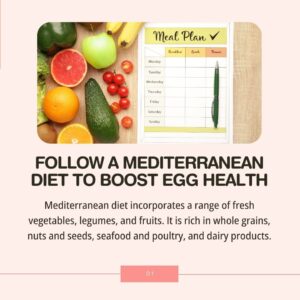How to Improve Egg Quality: The Expert Guide
Embarking on the parenthood journey can be exciting but challenging, especially if you experience infertility issues. One critical aspect to consider is egg quality, as it plays a pivotal role in determining the success of fertilisation and pregnancy outcomes, including in vitro fertilisation (IVF).
Many factors, such as genetics and age, are outside our control. However, the good news is that other contributing factors can be addressed through positive changes in diet and lifestyle.
In this blog post, we’ll explore the impact of these modifications and offer practical, actionable tips on how to improve egg quality, ultimately enhancing your fertility.
1. Follow a Mediterranean Diet to Boost Egg Health
Often referred to as the ‘Fertility Diet’, the Mediterranean diet incorporates a range of fresh vegetables, legumes, and fruits. It is rich in whole grains, nuts and seeds, seafood and poultry, and dairy products.
Unlike many typical Western-style diets, it focuses on limiting processed foods and red meats. This results in a lower intake of sugar and saturated fats while providing abundant antioxidants and unsaturated fats.
Recent research has reinforced the positive impact of the Mediterranean diet on IVF outcomes. A systematic review and meta-analysis showed that adherence to a Mediterranean dietary pattern was associated with an increased likelihood of achieving a clinical pregnancy and live birth in women undergoing assisted reproductive technologies (Kellow et al., 2022).
Another study found that preconception adherence to a diet rich in fruits, vegetables, dairy, and eggs positively influenced embryo quality (Wu et al., 2022).

2. Enhancing Egg Quality Through Targeted Supplements
Navigating the extensive selection of fertility supplements on the market can be confusing. However, some supplements provide significant benefits to egg quality. Coenzyme Q10 (CoQ10) is particularly noteworthy.
Research indicates that women who supplement with CoQ10 2-3 months before IVF/ICSI experience increased retrieval of mature oocytes, higher fertilisation rates, and improved embryo quality (Agarwal et al., 2024).
Additionally, a meta-analysis of six randomised controlled trials involving 1,529 women with diminished ovarian reserve (DOR) found that CoQ10 pretreatment significantly improved IVF/ICSI outcomes. Women supplementing with CoQ10 had higher clinical pregnancy rates, an increased number of optimal embryos, and more retrieved oocytes. Furthermore, CoQ10 was associated with reduced cycle cancellation and miscarriage rates (Lin et al., 2024), suggesting its valuable role in enhancing fertility outcomes.

Our Fertility Nutrition Assessment is designed as the first step in evaluating the quality of your diet, lifestyle, supplement intake, and exposure to environmental toxins. This personalised approach allows you to make informed decisions and optimise your reproductive health effectively. Click to learn more.
3. Minimise Consumption of Alcohol
Alcohol consumption has been linked to reduced fertilisation and implantation rates, as well as lower embryo quality in women undergoing IVF. Research indicates that excessive alcohol intake is associated with a lower number of retrieved oocytes, poorer embryo quality, and a decreased likelihood of achieving pregnancy (Nyandra et al., 2022).
A systematic review also found that maternal alcohol consumption increases the risk of miscarriage by 7% and 3% for each additional drink per week in both the first and second trimesters (Saxov et al., 2023).
Current Australian guidelines suggest that pregnant women, including those trying to conceive, should not consume any alcohol.

4. Minimise Endocrine Disrupting Chemicals (EDCs)
Our environment contains many endocrine-disrupting chemicals (EDCs) that can adversely affect fertility. Bisphenol A (BPA), commonly found in plastic containers, food packaging, and receipts, has been shown to affect oocyte health negatively.
A comprehensive review found that BPA exposure is linked to reduced antral follicle counts, impaired meiotic spindle integrity, and increased meiotic arrest, all contributing to poor egg quality (Peters et al., 2024).
Even BPA alternatives such as BPS and BPF, marketed as ‘BPA-free‘, have been found to exhibit similar harmful effects on oocyte development and fertility outcomes. Limiting exposure to BPA and other EDCs by using glass or stainless steel food containers, avoiding canned foods, and minimising contact with thermal paper receipts may help protect your reproductive health.

5. Minimise Oxidative Stress to Enhance Oocyte Quality
Oxidative stress is a major factor contributing to the decline in oocyte quality. It can impair mitochondrial function, damage DNA, and reduce fertilisation potential. Although quantifying oxidative stress in humans remains challenging, researchers have explored various strategies to mitigate its effects.
Animal studies have shown that antioxidant treatments can improve reproductive health, yet translating these findings to humans remains challenging (Tesarik, 2021). Other investigated treatments include platelet-rich plasma (PRP) therapy to rejuvenate ovarian function, though its effectiveness is still uncertain (Serdarogullari et al., 2024).
Another promising potential treatment is spermidine supplementation, which has been shown to improve mitochondrial function and egg quality in aging animal models. Spermidine is a naturally occurring polyamine compound found in every cell of the body and plays a crucial role in cellular health. However, further research is required to determine its safety and effectiveness in humans (Zhang et al., 2023).

Supporting Egg Quality Through a Holistic Approach
In the meantime, adopting a healthy diet and lifestyle can provide essential support for reproductive health. Nutrient-dense foods rich in antioxidants, such as leafy greens, berries, and nuts, can help combat oxidative stress, while omega-3 fatty acids from sources like oily fish support mitochondrial function.
Regular physical activity, stress management techniques such as mindfulness or yoga, and reducing exposure to endocrine-disrupting chemicals (EDCs) from plastics and cosmetics can further enhance egg quality.
Bottom Line
- Embrace a Mediterranean diet and incorporate antioxidant-rich foods to boost egg quality.
- Consider CoQ10 supplementation and minimise alcohol, caffeine, and exposure to endocrine disruptors.
- Support your overall reproductive health with regular exercise, stress management, and informed dietary choices.
By integrating these evidence-based strategies, you can proactively work toward boosting egg quality and enhancing your pregnancy success.
